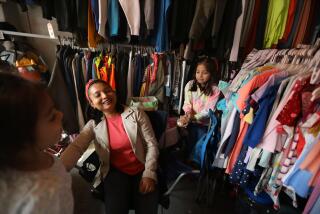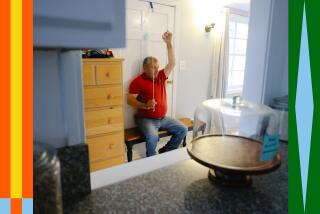Data show recessionâs wide impact
LOS ANGELES AND DENVER â In 2008, the median household income in the United States plummeted 3.6% from the year before, and the percentage of people living in poverty soared to an 11-year high, recently released U.S. Census data reveal.
Economists say the bleak news -- which they blame on the slew of layoffs that have accompanied the economic downturn -- is significant, if not entirely surprising.
âThe current recession has eliminated the gains that have been made in the last 10 years or so,â said Lee Ohanian, an economics professor at UCLA. But, he said, âthis is the pattern you typically see in a recession.â
The statistics donât surprise people like Aura Lopez either.
âIt is very difficult to get by always, but it is especially difficult now,â said Lopez, 28, a Guatemalan immigrant in Los Angeles who is unemployed. She said she used to send $450 every month to her two young daughters in Guatemala, but these days, she sends nothing.
The census data, culled earlier this year from the Current Population Survey, represent the Census Bureauâs most current findings and reflect the impact of the early part of the recession, which economists say started in December 2007.
The data show the devastation of the recession through various economic indicators, such as the real median household income. In 2007 it was $52,163. A year later it dropped to $50,303, the lowest level since 1997.
The nationâs poverty rate, meanwhile, rose to 13.2%, the highest level since 1997.
The new data also cast a spotlight on the recessionâs principal victims: children, minorities and those who werenât born in the United States.
The number of children younger than 18 living in poverty increased from 13.3 million in 2007 to 14.1 million in 2008, the census says, with minority children more likely to be poor.
Last year, 34.7% of black children and 30.6% of Latino children lived below the poverty line, compared with 10.6% of white children.
Foreign-born people living in the United States were also more likely to live in poverty than American-born citizens, with 17.8% of people born outside the country living beneath the poverty line, compared with 12.6% of native-born Americans.
The data also suggest that Latinos have suffered economically more than other groups in the last year. Between 2007 and 2008, the median income for Latino households declined 5.6%, to $37,913. At the same time, the median income for non-Latinos fell 2.6%, to $55,530.
Ohanian, who studies recessions, says minorities and people born outside the country often suffer disproportionately during recessions, in part because they often have less advanced education.
âJob loss tends to be concentrated most highly among those with the least amount of education and formal training,â he said.
William H. Frey, a demographer at the Brookings Institution, said those at the bottom of the income ladder suffer because their jobs are often among the first to be cut.
âTheyâve been hit hard because theyâve had a lot of the low-paying jobs which have been jettisoned easily,â Frey said.
The census data indicate that although the recession has hit some groups harder than others, it has affected almost all Americans.
In Arvada, Colo., a suburb northwest of Denver, the Arvada Community Food Bank has experienced a dramatic increase in the number of families seeking help over the last year, executive director Ernest Giron said.
In summer 2008, an average of 28 families per day came in for food; by fall, that number had jumped by 35%.
âWe had a tremendous spike,â Giron said. âA lot were newly laid off, or their hours were being reduced significantly. They werenât working 40 hours a week anymore. Some were getting pink slips and having to come to the food bank for the first time in their adult life.â
A year later, the food bank is serving as many as 54 families per day, Giron said.
Several weeks ago, he encountered one well-dressed man waiting for his wife to pick out their food.
âHe said, âI know you think Iâm dressed pretty good for a food bank, but Iâve been laid off for eight months, and from here, Iâm going to an interview. Before, we were able to give to the food bank. Now I have to come because our kids have to have food,â â Giron recalled.
In Los Angeles, Lopez has also had trouble paying for basics, such as food and rent for her room in Koreatown.
âWe used to be able to go shopping and buy things that were not absolutely necessities, like clothes and toys,â she said. âThose things I can no longer do. We cannot afford to go to the doctor, so we try hard not to get sick.â
--
Correll writes for The Times.
More to Read
Sign up for Essential California
The most important California stories and recommendations in your inbox every morning.
You may occasionally receive promotional content from the Los Angeles Times.











